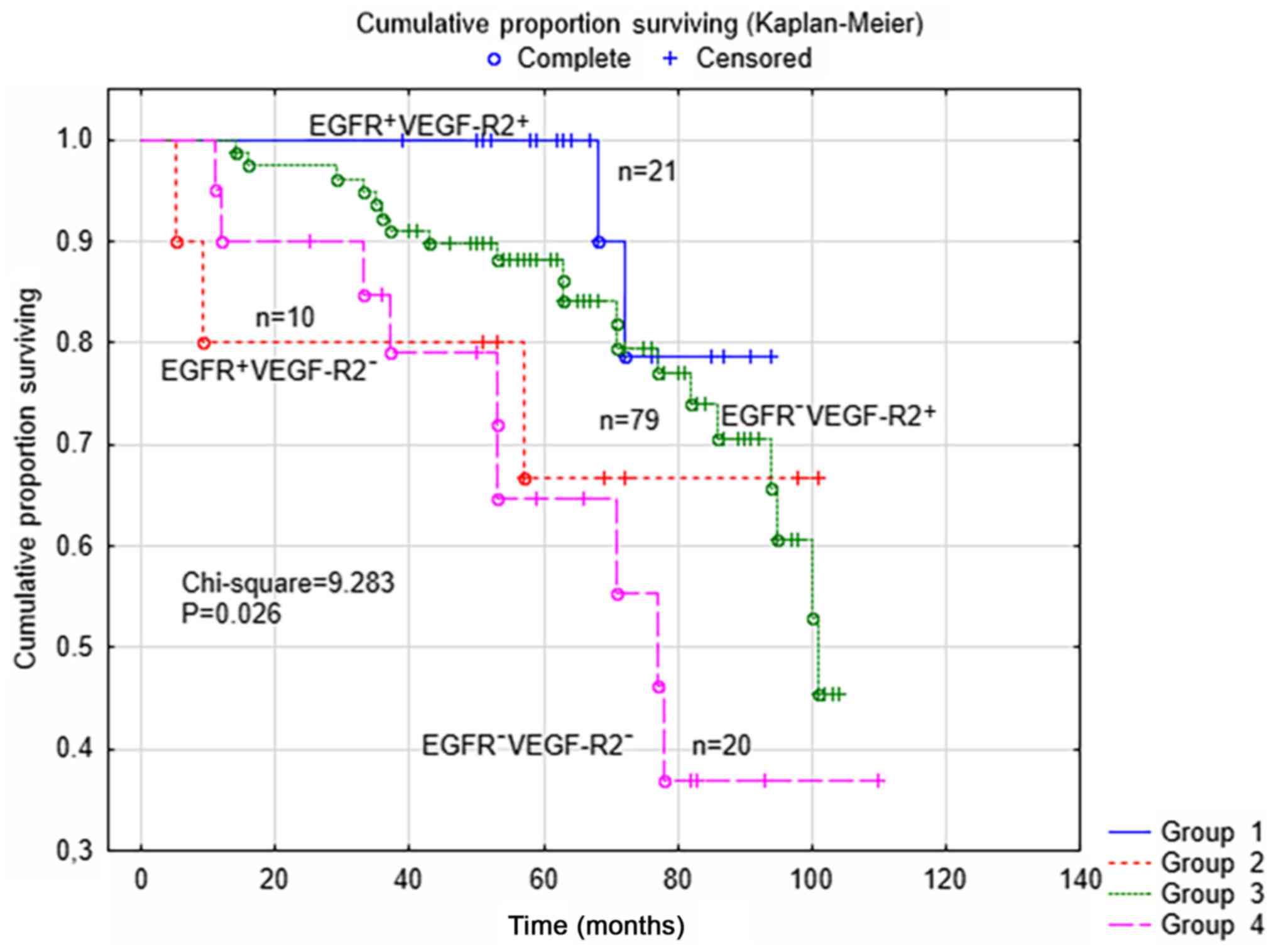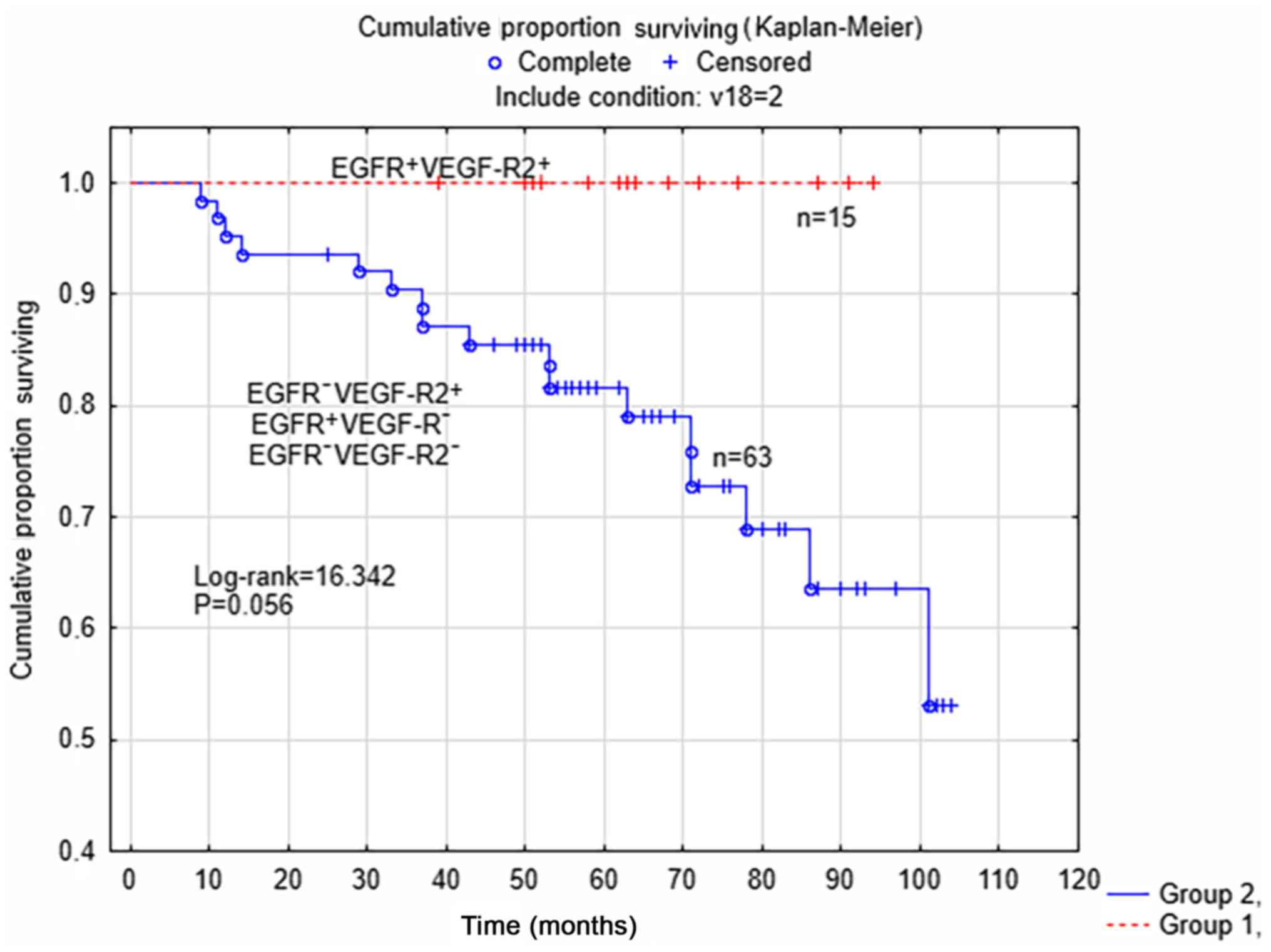|
1
|
Siwak DR, Carey M, Hennessy BT, Nguyen CT,
McGahren Murray MJ, Nolden L and Mills GB: Targeting the epidermal
growth factor receptor in epithelial ovarian cancer: Current
knowledge and future challenges. J Oncol. 2010:5689382010.
View Article : Google Scholar
|
|
2
|
Sheng Q and Liu J: The therapeutic
potential of targeting the EGFR family in epithelial ovarian
cancer. Br J Cancer. 104:1241–1245. 2011. View Article : Google Scholar : PubMed/NCBI
|
|
3
|
Skirnisdottir I, Sorbe B and Seidal T: The
growth factor receptors HER-2/neu and EGFR, their relationship, and
their effects on the prognosis inearly stage (FIGO I-II) epithelial
ovarian carcinoma. Int J Gynecol Cancer. 11:119–129. 2001.
View Article : Google Scholar
|
|
4
|
Gavalas NG, Liontos M, Trachana SP,
Bagratuni T, Arapinis C, Liacos C, Dimopoulos MA and Bamias A:
Angiogenesis-related pathways in the pathogenesis of ovarian
cancer. Int J Mol Sci. 14:15885–15909. 2013. View Article : Google Scholar : PubMed/NCBI
|
|
5
|
Klasa-Mazurkiewicz D, Jarząb M, Milczek T,
Lipińska B and Emerich J: Clinical significance of VEGFR-2 and
VEGFR-3 expression in ovarian cancer patients. Pol J Pathol.
62:31–40. 2011.PubMed/NCBI
|
|
6
|
Nishida N, Yano H, Komai K, Nishida T,
Kamura T and Kojiro M: Vascular endothelial growth factor C and
vascular endothelial growth factor receptor 2 are related closely
to the prognosis of patients with ovarian carcinoma. Cancer.
101:1364–1374. 2004. View Article : Google Scholar : PubMed/NCBI
|
|
7
|
Lassus H, Sihto H, Leminen A, Joensuu H,
Isola J, Nupponen NN and Butzow R: Gene amplification, mutation,
and protein expression of EGFR and mutations of ERBB2 in serous
ovarian carcinoma. J Mol Med (Berl). 84:671–681. 2006. View Article : Google Scholar
|
|
8
|
Maj E, Papiernik D and Wietrzyk J:
Antiangiogenic cancer treatment: The great discovery and greater
complexity (Review). Int J of Oncol. 49:1773–1784. 2016. View Article : Google Scholar
|
|
9
|
Elie C, Geay JF, Morcos M, Le Tourneau A,
Girre V, Broët P, Marmey B, Chauvenet L, Audouin J, Pujade-Lauraine
E, et al GINECO Group: Lack of relationship between EGFR-1
immunohistochemical expression and prognosis in a multicentre
clinical trial of 93 patients with advanced primary ovarian
epithelial cancer (GINECO group). Br J Cancer. 91:470–475. 2004.
View Article : Google Scholar : PubMed/NCBI
|
|
10
|
Skirnisdottir I, Seidal T and Åkerud H:
The relationship of the angiogenesis regulators VEGF-A, VEGF-R1 and
VEGF-R2 to p53 status and prognostic factors in epithelial ovarian
carcinoma in FIGO-stages I-II. Int J Oncol. 48:998–1006. 2016.
View Article : Google Scholar : PubMed/NCBI
|
|
11
|
World Medical Association: WMA Declaration
of Helsinki Ethical Principles for Medical Research Involving Human
Subjects. https://www.wma.net/policies-post/wma-declaration-of-helsinki-ethical-principles-for-medical-research-involving-human-subjects.
|
|
12
|
Trimbos JB, Vergote I, Bolis G, Vermorken
JB, Mangioni C, Madronal C, Franchi M, Tateo S, Zanetta G, Scarfone
G, et al EORTC-ACTION collaborators; European Organisation for
Research and Treatment of Cancer-Adjuvant ChemoTherapy in Ovarian
Neoplasm: Impact of adjuvant chemotherapy and surgical staging in
early-stage ovarian carcinoma: European Organisation for Research
and Treatment of Cancer-Adjuvant ChemoTherapy in Ovarian Neoplasm
trial. J Natl Cancer Inst. 95:113–125. 2003. View Article : Google Scholar : PubMed/NCBI
|
|
13
|
Kononen J, Bubendorf L, Kallioniemi A,
Bärlund M, Schraml P, Leighton S, Torhorst J, Mihatsch MJ, Sauter G
and Kallioniemi OP: Tissue microarrays for high-throughput
molecular profiling of tumor specimens. Nat Med. 4:844–847. 1998.
View Article : Google Scholar : PubMed/NCBI
|
|
14
|
Seidal T, Balaton AJ and Battifora H:
Interpretation and quantification of immunostains. Am J Surg
Pathol. 25:1204–1207. 2001. View Article : Google Scholar : PubMed/NCBI
|
|
15
|
Köbel M, Kalloger SE, Boyd N, McKinney S,
Mehl E, Palmer C, Leung S, Bowen NJ, Ionescu DN, Rajput A, et al:
Ovarian carcinoma subtypes are different diseases: Implications for
biomarker studies. PLoS Med. 5:e2322008. View Article : Google Scholar : PubMed/NCBI
|
|
16
|
Despierre E, Vergote I, Anderson R, Coens
C, Katsaros D, Hirsch FR, Boeckx B, Varella-Garcia M, Ferrero A,
Ray-Coquard I, et al European Organisation for Research and
Treatment of Cancer-Gynaecological Cancer Group (EORTC-GCG); Groupe
d'Investigateurs Nationaux pour les Etudes des Cancers de l'Ovaire
(GINECO); Austrian Arbeitsgemeinschaft für Gynäkologische Onkologie
(A-AGO); National Cancer Research Institute (NCRI); Australia New
Zealand Gynaecological Oncology Group (ANZGOG); Mario Negri
Gynecologic Oncology group (MaNGO): Epidermal growth factor
receptor (EGFR) pathway biomarkers in the randomized phase III
trial of erlotinib versus observation in ovarian cancer patients
with no evidence of disease progression after first-line
platinum-based chemotherapy. Target Oncol. 10:583–596. 2015.
View Article : Google Scholar : PubMed/NCBI
|
|
17
|
de Graeff P, Crijns APG, Ten Hoor KA, Klip
HG, Hollema H, Oien K, Bartlett JM, Wisman GB, de Bock GH, de Vries
EG, et al: The ErbB signalling pathway: Protein expression and
prognostic value in epithelial ovarian cancer. Br J Cancer.
99:341–349. 2008. View Article : Google Scholar : PubMed/NCBI
|
|
18
|
Zeineldin R, Muller CY, Stack MS and
Hudson LG: Targeting the EGF receptor for ovarian cancer therapy. J
Oncol. 2010:4146762010. View Article : Google Scholar : PubMed/NCBI
|
|
19
|
Huang J, Hu W and Sood AK: Prognostic
biomarkers in ovarian cancer. Cancer Biomark. 8:231–251. 2010.
View Article : Google Scholar : PubMed/NCBI
|
|
20
|
Cao C, Lu S, Sowa A, Kivlin R, Amaral A,
Chu W, Yang H, Di W and Wan Y: Priming with EGFR tyrosine kinase
inhibitor and EGF sensitizes ovarian cancer cells to respond to
chemotherapeutical drugs. Cancer Lett. 266:249–262. 2008.
View Article : Google Scholar : PubMed/NCBI
|
|
21
|
Komatsu H, Oishi T, Itamochi H, Shimada M,
Sato S, Chikumi J, Sato S, Nonaka M, Sawada M, Wakahara M, et al:
Serum vascular endothelial growth factor-A as a prognostic
biomarker for epithelial ovarian cancer. Int J Gynecol Cancer.
27:1325–1332. 2017. View Article : Google Scholar : PubMed/NCBI
|
|
22
|
Burger RA: Role of vascular endothelial
growth factor inhibitors in the treatment of gynecologic
malignancies. J Gynecol Oncol. 21:3–11. 2010. View Article : Google Scholar : PubMed/NCBI
|
|
23
|
Tang C, Hess K, Jardim DL, Gagliato Dde M,
Tsimberidou AM, Falchook G, Fu S, Janku F, Naing A, Piha-Paul S, et
al: Synergy between VEGF/VEGFR inhibitors and chemotherapy agents
in the phase I clinic. Clin Cancer Res. 20:5956–5963. 2014.
View Article : Google Scholar : PubMed/NCBI
|
|
24
|
Hicklin DJ and Ellis LM: Role of the
vascular endothelial growth factor pathway in tumor growth and
angiogenesis (review). J Clin Oncol. 23:1011–1027. 2005. View Article : Google Scholar
|
|
25
|
Casanovas O, Hicklin DJ, Bergers G and
Hanahan D: Drug resistance by evasion of antiangiogenic targeting
of VEGF signaling in late-stage pancreatic islet tumors. Cancer
Cell. 8:299–309. 2005. View Article : Google Scholar : PubMed/NCBI
|
|
26
|
Bergers G and Hanahan D: Modes of
resistance to anti-angiogenic therapy. Nat Rev Cancer. 8:592–603.
2008. View
Article : Google Scholar : PubMed/NCBI
|
|
27
|
Takahashi Y, Saga Y, Koyanagi T, Takei Y,
Machida S, Taneichi A, Mizukami H, Sato Y, Matsubara S and Fujiwara
H: The angiogenesis regulator vasohibin-1 inhibits ovarian cancer
growth and peritoneal dissemination and prolongs host survival. Int
J Oncol. 47:2057–2063. 2015. View Article : Google Scholar : PubMed/NCBI
|
|
28
|
Annunziata CM, Walker AJ, Minasian L, Yu
M, Kotz H, Wood BJ, Calvo K, Choyke P, Kimm D, Steinberg SM, et al:
Vandetanib, designed to inhibit VEGFR2 and EGFR signaling, had no
clinical activity as monotherapy for recurrent ovarian cancer and
no detectable modulation of VEGFR2. Clin Cancer Res. 16:664–672.
2010. View Article : Google Scholar : PubMed/NCBI
|
















